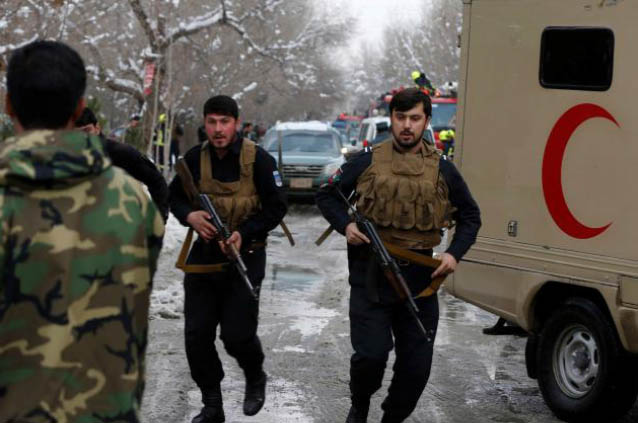Following the twin blasts targeted parliament which left nearly 40 killed and more than 100 wounded, a suicide bomber detonated his explosives near the Supreme Court building in Kabul on Tuesday afternoon, killing 20 people and wounding at least 48 others including dozens of women and children. It is also said that a number of wounded are in critical condition and have been taken to the Kabul Emergency Hospital. The attacker was on foot and detonated his suicide vest packed with explosives near the employees and other people as they were coming out of the main court building, the deputy spokesman for interior ministry Mr. Danish said. Eyewitnesses said it was a powerful explosion that shook nearby buildings and that most of the casualties had been civilians. No group has claimed responsibility for the attack yet. However, Taliban targeted government judicial workers in the past since the execution of six convicted insurgents last May.
The insurgents have been at war with government for 15 years and have increasingly targeted the judiciary since the execution of six convicted insurgents last May; As shortly after the executions, a suicide bomber targeted a minibus carrying court employees in Kabul during the morning rush hour, killing 11 people in an attack claimed by the Taliban, which called it an act of revenge. In June, three Taliban fighters stormed a court building in the eastern Logar province, killing seven people, including a newly appointed chief prosecutor, before being shot dead by police. In a similar incident an explosion occurred in the same place - killing 17 people and injuring 39 others In June 2013.
It is also simultaneous with a roadside bombing in Farah province in which a top government official was killed. Abdul Khaliq, the top official in the Khak-e-Safed district, was on his way home from the mosque when he was killed. Reportedly, responsibility for that attack was claimed by the Taliban. The Taliban controlled most of Afghanistan before being driven out of power following the terror attacks in the US in September 2001. The group continues to carry out attacks across Afghanistan aimed at destabilizing the U.S.-backed, elected government. The U.S. military has handed off primary responsibility for security in Afghanistan to the Afghan government, although thousands of U.S. forces remain there in mostly advisory and support roles.
President Ashraf Ghani has strongly condemned the suicide bombing; in a statement issued by the presidential palace, Ghani said the attack was inhumane and an unforgiveable attack. He said: “By this act the enemies of the Afghan people once again showed their enmity towards the people.” Ghani also sent his condolences to the victim’s families and wished the wounded a swift recovery. CEO Abdullah Abdullah also condemned the incident. Writing on his twitter account he said: "I condole with the families of the victims in today's terrorist attack in Kabul. The blood of our people isn't cheap and won’t be wasted."
Thus, U.N. Secretary-General Antonio Guterres also condemned the suicide attack.“Those who are behind bombing and other such despicable acts must face justice,” spokesman Stephane Dujarric said at U.N. headquarters in New York. “Indiscriminate attacks against civilians, including employees of the judicial institutions, are violations of human rights and international humanitarian law and cannot be justified.” According to a separate report in Kabul, UN proclaimed 2016 was the bloodiest year for Afghan civilians since the war began in 2001. Last year there were 11,418 civilian casualties, including 3,498 deaths. The rise in casualties is a result of the Taliban slowly gaining ground across the country, with fighting creeping closer to residential areas after the large-scale withdrawal of foreign combat troops.
According to SIGAR, a US congressional watchdog, an estimated 28.7% of Afghans live in territory fought over between government forces and the Taliban, in the winter, when fighting in the battlefields slows, the Taliban have been known to increase their attacks on larger cities. In the past 12 months, Kabul in particular has become more dangerous, with 77% of civilian casualties from suicide and complex attacks in 2016 occurring there, the UN report said.
Considering the growing insecurity crises in Afghanistan it was expected to be an urgent agenda for the new USA administration while President Trump has paid the least attention on Afghanistan. Repeated bids to launch peace negotiations with the Taliban have failed and a fierce new fighting season is likely to kick off in the spring. However, Afghanistan recently welcomed the Pentagon’s decision to deploy some 300 Marines to Helmand, where American forces engaged in heated combat until their mission ended in 2014. While Trump has given the Pentagon 30 days to come up with a new plan to defeat the self-described caliphate, there has been no similar order for Afghanistan. It’s unclear if the White House simply wants to maintain Obama administration policies to bolster Afghan forces and keep some U.S. troops in the country for counter terror missions.
On the other hand, Moscow has started to play a major role in the country preparing a conference of leading regional powers while Western powers are not included. Foreign Minister Sergei Lavrov confirmed Moscow would host a meeting in mid-February with representatives from Afghanistan, Pakistan, China, Iran and India during a press conference with his counterpart from Kabul Salahuddin Rabbani. Lavrov reiterated Moscow´s stance that "the Taliban must be included in a constructive dialogue" to help find a solution to halt worsening violence in the war-ravaged nation at a time the Islamic State group has expanded its presence.

